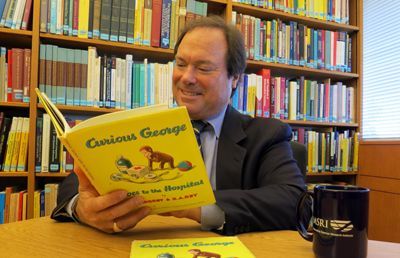Curious George is a perennial favorite among pre-K readers. But have you met George’s cousin, who loves math?
As a child, Roger Strauch watched as his relatives, Margaret and Hans Rey, worked to write and illustrate the latest Curious George adventure. Strauch is now the CEO of The Roda Group, a Bay Area-based seed stage venture capital group. He is also the board chair of the Mathematical Sciences Research Institute (MSRI), a nonprofit in Berkeley, California, one of the premier collaborative scientific research institutions in the world. He has helped create a number of high tech companies in the fields of information, medicine, and clean technology.
His philanthropic initiatives focus on theatre arts, developing countries, and his passion for education shines through when he talks about mathematics. “Math is not only a tool,” Strauch maintains, “it’s a language for creation and communication, a language by which we solve problems and create knowledge. It enables us to understand, and occasionally manage, the world around us.”
Indeed, Roger Strauch is a man of many talents and ambitions: he is a venture capitalist, an entrepreneur, and a philanthropist. But Strauch’s most recent project is more closely related to his childhood, and many hours spent in the living room chatting with his aunt and uncle. About eight years ago, Strauch began advocating for the creation of a new national prize in children’s literature related to mathematics.
Strauch reminisces, “I would spend many Sundays at the home of my aunt and uncle, Margaret and Hans Rey, the creators of Curious George. At family gatherings, my dad would inevitably ask them, “what are you working on, what’s your latest project?” and they would show us their books in progress. My brother Hans and I would be invited to observe Uncle Hans’ illustration creation process in his upstairs studio in their Hilliard Street, Cambridge, Massachusetts home.
Strauch most clearly remembers the Reys’ crafting of Curious George Goes to the Hospital. “The National Hospital Association asked them to take their talent and their character, and help kids be more comfortable in the hospital, because they were terrified,” he says, “We saw them develop that book over a number of months. The process was very exciting, and the book was and continues to be well-received.”
Strauch wants to assuage young people’s fear of math in the same way his aunt and uncle assuaged their fear of the hospital: through literature. This hope has come to fruition with the launch of his brainchild, Mathical: Books for Kids from Tots to Teens, a new children’s book prize. The contest is devoted to recognizing excellent new and backlist youth literature related to mathematics.
MSRI has collaborated with the Children’s Book Council to sponsor the new prize, which will recognize books written for a wide age range, from early readers through high school, in a national competition that is the first of its kind. Teachers and librarians are already clamoring for the short-list, and the submission by publishers of nearly 175 titles shows the depth of interest on their part.
“The way this idea got cooked up,” explains Strauch, “was that David Eisenbud, Director of MSRI, and I were having a conversation about how to best promote understanding and appreciation of math — that’s our core mission at MSRI — and I mentioned Harry Potter. What Harry Potter did for kids and reading, we want to do for kids and math.”
“Too few young kids are exposed to the excitement and fascination of mathematics,” adds Strauch. “Helping children and teenagers view mathematics as a series of patterns to spot, and puzzles to solve, can pique their interest and understanding.” Strauch wants kids to be more than just vaguely interested in math; he wants them to be comfortable and secure with it, and to embrace math without fear as something “fun, cool, and powerful.” He wants kids to see math as a means to pursue their passion for personal satisfaction and professional impact.
His hope is that the Mathical Book Prize and its new definition of “mathematical literacy” will help make that change.
